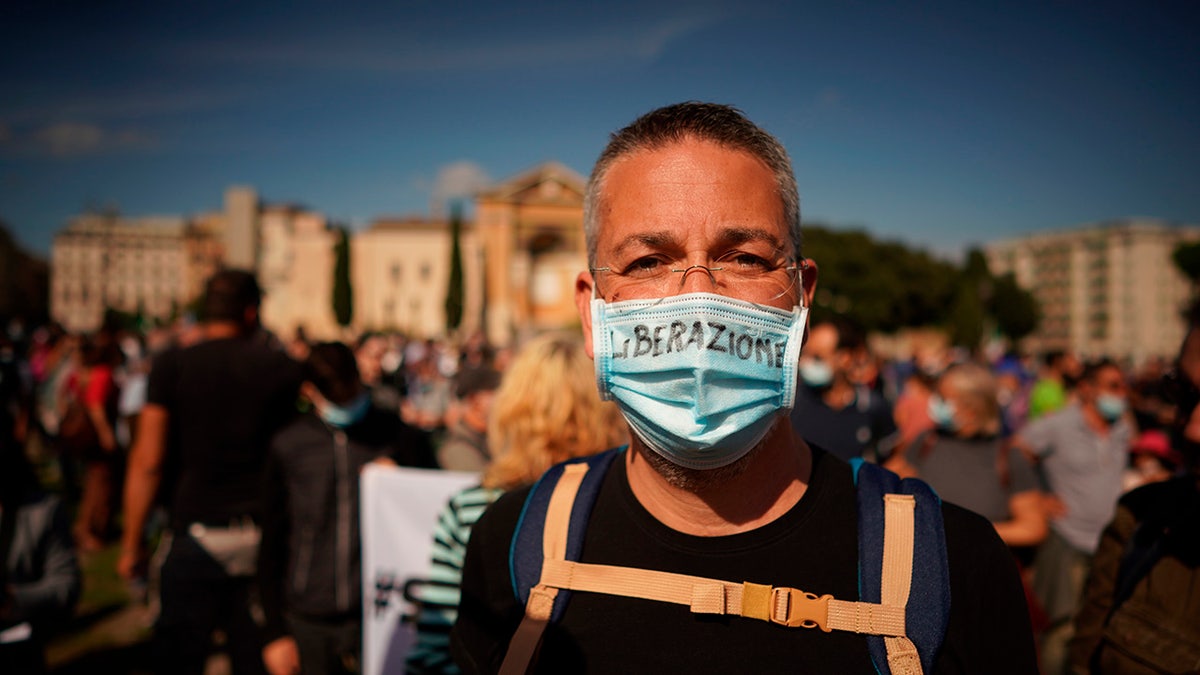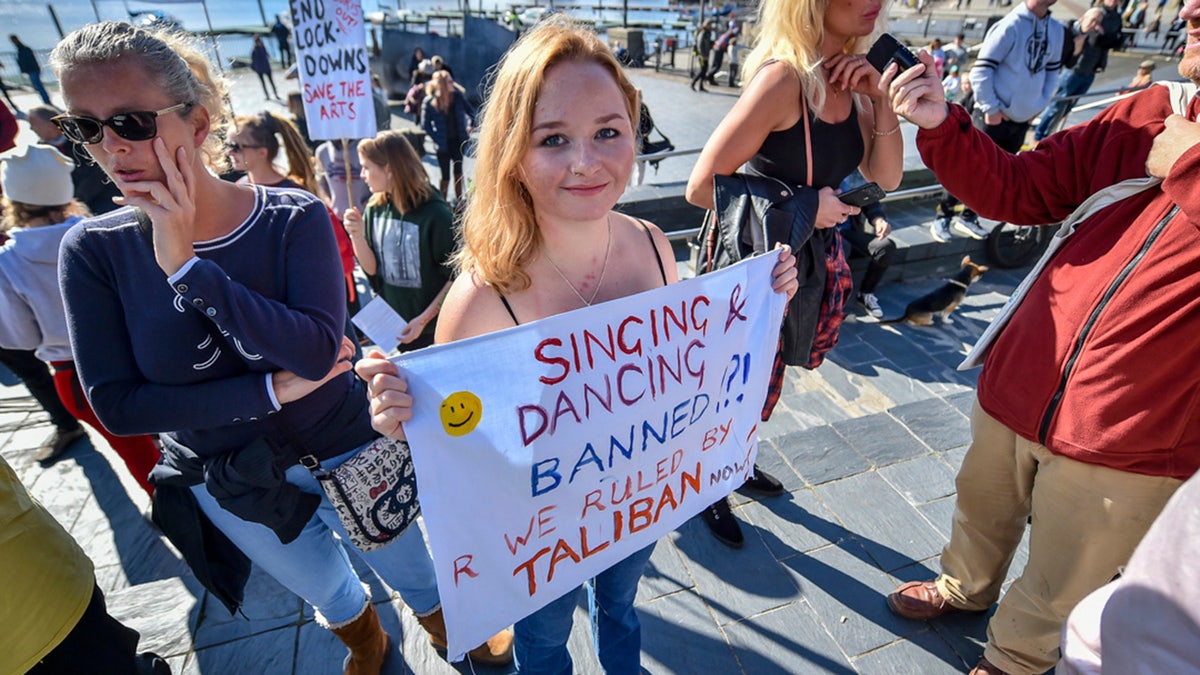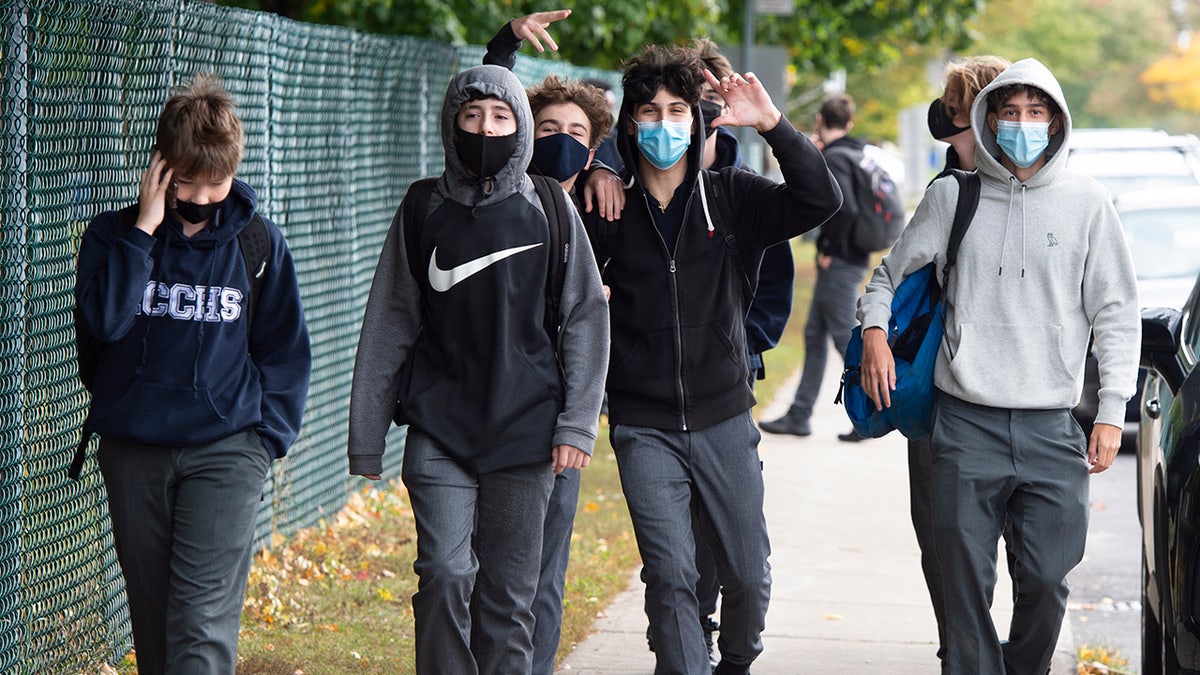WHO warns of surge in coronavirus cases in Europe
Europe is seeing more weekly coronavirus cases than it did in March’s peak; Amy Kellogg reports.
Across Europe, large groups have amassed in staunch refusal to wear cloth coverings as recommended to curb the spread of the novel coronavirus, igniting anxieties from the top brass over a rise in cases.
This week, French President Emmanuel Macron declined to dismiss the possibility of another mass lockdown after health officials documented a spike of 43,000 infections over the weekend. The government has issued a call for front-line volunteers to deploy to hospitals – seeking medical professionals as well as students and cooks – and warned of a second wave seeping in.

People wearing masks walk down a street in Saint Jean de Luz, southwestern France, Monday, Oct. 12, 2020. Some parts of France have been put on maximum coronavirus alert level, which means shutting down bars, implementing stricter measures in restaurants and limiting private gatherings. (AP Photo/Bob Edme)
France has been one of the hardest-hit European countries amid the pandemic, with over 740,000 infections and almost 33,000 deaths.
Italy – the first Western country to be assaulted by the virus in the early weeks of the year as scores from Wuhan, China, poured in with working visas – is grappling not only with a rise of infections in recent days in its northern regions but a resurgence of frustrations over its crippled economy and mask policy in less-impacted areas.
Rome was the site of two separate anti-mask convocations on Sunday, with many bemoaning a new edict for all Italians to wear masks outside or face fines up to $1,200.

A woman wears a mask reading in Italian Liberazione (Liberation) as people gather to protest against the government restriction measures to curb the spread of COVID-19, in Rome, Saturday, Oct. 10, 2020. (AP Photo/Andrew Medichini)
Some 365,000 Italians have contracted the virus, and more than 36,200 have lost their lives.
CLOTH CORONAVIRUS FACE MASKS WORK — BUT ONLY IF YOU DO THIS AFTER WEARING THEM, STUDY FINDS
Moreover, Germany – which is generally considered to have fared better in the outbreak than most of its EU counterparts – has also been host to its swell of dissidents endeavoring to get back to business.
"People in Europe, especially in Germany, are sick and tired of the mask mandate. We have seen the success of the Swedish approach, that never locked down the economy and never made masks mandatory," global economics expert Carsten Pfau, a German national and founder of the Agri Terra Group, told Fox News. "The number of people that are walking around with a face mask is growing, and yet there are still growing infections, and politicians seem to have no answer why."
The Swedish model – imposing some restrictions, but refusing to completely shutter schools and the economy – has been controversial. Some studies point to it as a success story with a now dropping death rate, while other analyses suggest its infections per capita has been alarmingly higher than bordering countries.
Earlier this month, around 11,000 people disregarded virus rules and restrictions in demonstrations for a full weekend of anti-government pushback in about 12 separate rallies, a police spokesperson told the press at the time. In one instance, tear gas was used by authorities in a bid to keep opposing groups apart and avoid violence.
This comes on the heels of weeks of national unrest. Some 18,000 people filled the streets of Berlin on Aug. 29, while at least 10,000 people marched through London on the same day voicing their fears that the pandemic was designed to derail democracy.
Brussels, Dublin, Madrid, Rotterdam and Zurich have also seen smaller billows of mask-free protests – ranging from 100 to 1,000 people – in recent weeks, irked by government decrees in response to the health crisis.
Germany has had more than 330,000 cases of coronavirus, and 9,640 people are known to have died from it.
"The more the frustrated in Europe and the world see mask protests, the more populations feel justified to protest," contended Scott Sobel, a D.C.-based media and political strategist and senior vice president at public relations firm kglobal. "Even though wearing masks and social distancing are the best weapons, we have to fight the virus."
From his purview, the reasons behind the European protests are less politically based than the demonstrations in the U.S. "as the presidential election affects everything."

A woman holds a banner during an anti-lockdown protest outside the Senedd Cymru in Cardiff Bay, Wales, Sunday, Oct. 11, 2020. So far the U.K. has experienced Europe’s deadliest virus outbreak, with over 42,750 confirmed deaths. (Ben Birchall/PA via AP)
"We are all feeling mounting frustration as the virus controls our lives and the anti-mask protests are an emotional response to what should be logical, protective action," he said. "All doctors and scientists of standing warn masks are equally as important, if not more, to stave off infection than a vaccine will be."
But across the pond in Canada, "Our Body, Our Choice" has become something of a rallying cry for anti-maskers gathering in Montreal and Vancouver since September.
"We want our body, our choice," Ryan Kulbaba, a "March for Freedom" organizer, told a crowd of tens of thousands as they gathered in front of the Vancouver Art Gallery last month. "This is all due to a virus that has spread around the world. It's not called COVID; it's called socialism and communism."

Students from Lasalle Community Comprehensive High School walk out of class to protest COVID-19 safety concerns Thursday, Oct. 1, 2020 in Montreal. (Ryan Remiorz/The Canadian Press via AP)
The outburst stemmed just days after authorities in Quebec announced that it started issuing fines – varying from about $300 to $4,500 – for mask violations.
In Canada, at least 184,000 have tested positive for the pathogen and almost 9,700 fatalities have been recorded as of Tuesday.
The United States is hardly immune to anti-mask protests, although on a far smaller scale than those sweeping across parts of Canada, the U.K. and Europe.
"The protests in Nevada are made from sensible people that feel the governor overstepped his authority since by and large Nevada has huge areas with counties that haven't had a COVID problem," said Boone Cutler, a U.S. Army veteran and coordinator of small anti-mask rallies that have peppered his state since the spring. "We've not been short on medical equipment. The at-risk folks should have gotten protected, and the state could have gotten along fine with an optional mask policy."
In Utah, a few hundred turned out for a mask opposition revolt on Aug. 21 – which later became rich fodder for social media parody – after it was demanded that the coverings be worn in schools statewide, attracting complaints that it was a form of "child abuse."
Then in Florida last month, a small flash mob of sorts stormed through a Fort Lauderdale Target store with naked faces, claiming it was their right to live mask-free.
Just this week, New York dished out about $150,000 in citations to ultra-Orthodox Jews in Brooklyn who have engaged in anti-mask, anti-shutdown protests after a revived lockdown was placed on their neighborhood amid a rise in new coronavirus cases. This included some five houses of worship, which were slapped with a summons on Monday for disobeying the governor's orders.
The U.S. has documented some 7.8 million coronavirus infections, of which 215,000 have died.
A Fox News analysis of anti-mask protests across the West shows that – with the exception of religious congregations – most are typically organized through Facebook groups, spread through word-of-mouth, sometimes fueled by conspiracy theories, and other times the genesis of genuine frustration over government orders.
FIRST CORONAVIRUS REINFECTION CASE RECORDED IN US
Concerns raised vary from the clash of misinformation to widely debunked assumptions that masks are not only useless but harmful to one's breathing and health. There are also claims that they lead to the traumatization of children and are an excuse for authorities to tighten their grip on the populous.
Initially, the World Health Organization (WHO) advised against masks for the general population – claiming that it gave a false sense of security – but reversed its stance in June, citing research that indicated it was effective in halting the pathogen's dissemination.
"The reasons behind the protests are rooted in people's distrust of the government, distrust of the media, and simply not wanting their lives infringed upon. Nobody is saying to not protect the at-risk people; people are saying look at the health statistics for the not at-risk people, then make a logical decision," Cutler proclaimed. "Logically, their lives didn't require disruption because they are healthy enough to fight the virus."

Primary care workers take part in a protest against their working conditions during a strike in Barcelona, Spain, Tuesday, Oct. 13, 2020. Various regions in Spain, including northern Navarra and northeastern Catalonia, are either planning or implementing fresh restrictions against the spread of the new coronavirus. Signs read: "Enough". (AP Photo/Emilio Morenatti)
Yet even as the weather dramatically cools and with winter on the horizon, some observers don't see the no-mask movement diminishing.
"Frustration will grow as the world is handcuffed by growing infection rates of the virus during colder weather. Protests will continue as populations have more personal experiences with the pandemic, lose work and their freedom, but will protests solve anything? The virus is not political," Sobel cautioned. "Screaming and removing masks will do nothing to solve problems but give the powerless a sense of at least trying to take control of their lives when in fact, the end effect will be more illness and less control."
Nonetheless, Cutler argued that pushback against the government would emerge in a different way.
"I expect the protests will stop growing because people will simply take life back to its normal routine on their own," he added. "That is the best way to protest."
Across the world, almost 38 million have contracted coronavirus, and 1.8 million have died.



